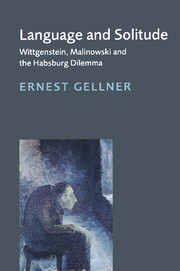Book contents
- Frontmatter
- Contents
- Preface
- Foreword
- Part I The Habsburg dilemma
- 1 Swing alone or swing together
- 2 The rivals
- 3 Genesis of the individualist vision
- 4 The metaphysics of romanticism
- 5 Romanticism and the basis of nationalism
- 6 Individualism and holism in society
- 7 Crisis in Kakania
- 8 Pariah liberalism
- 9 Recapitulation
- Part II Wittgenstein
- Part III Malinowski
- Part IV Influences
- Part V Conclusions
- General bibliography
- Bibliographies of Ernest Gellner's writings on Wittgenstein, Malinowski, and nationalism
- Index
2 - The rivals
Published online by Cambridge University Press: 05 March 2010
- Frontmatter
- Contents
- Preface
- Foreword
- Part I The Habsburg dilemma
- 1 Swing alone or swing together
- 2 The rivals
- 3 Genesis of the individualist vision
- 4 The metaphysics of romanticism
- 5 Romanticism and the basis of nationalism
- 6 Individualism and holism in society
- 7 Crisis in Kakania
- 8 Pariah liberalism
- 9 Recapitulation
- Part II Wittgenstein
- Part III Malinowski
- Part IV Influences
- Part V Conclusions
- General bibliography
- Bibliographies of Ernest Gellner's writings on Wittgenstein, Malinowski, and nationalism
- Index
Summary
The standing of the two philosophic visions is not altogether similar. Their histories, their places in the world, are not fully parallel. The atomistic one was the first to receive deliberate formulation, but not the first to come into existence. Partisans of the organic vision would say that just because it is the primordial and normal form, it needed no articulation. It was at its best when it was free of self-consciousness, when it had no need to reflect on its own existence. Its innocence was its glory, the sign of its primordial and legitimate place in human life. Formulating it and presenting it as a theory may well soil it. Its validity lies beyond argument, arguing its merits only demeans and contradicts it. A real traditionalist does not know that he is one, his tradition simply is his life and his being: once he knows it as a tradition, one among others, or even as opposed to reason, he has been corrupted by his knowledge of something else.
The fact that the atomistic view was formulated before ever it was lived may likewise be a sign of its artificial, indeed pathological character. Live first, think after: those who need to think out their identity before living it betray their unfitness to live. Nobility is conveyed by the priority of being over thought, which is but a kind of embellishment, not a refuge or fortification. Aristocrats simply are, parvenus do, the rootless try to argue their identity. Such, at any rate, would be the ‘organic’ view of the matter.
- Type
- Chapter
- Information
- Language and SolitudeWittgenstein, Malinowski and the Habsburg Dilemma, pp. 7 - 13Publisher: Cambridge University PressPrint publication year: 1998



